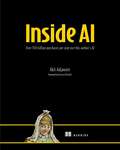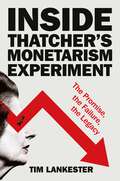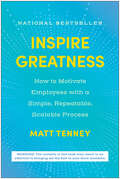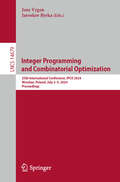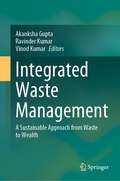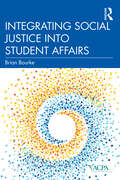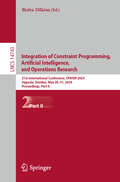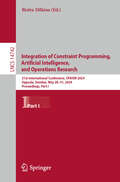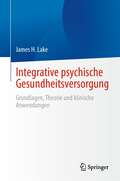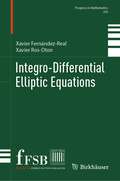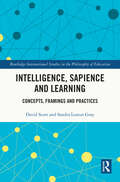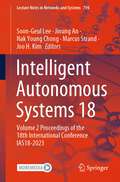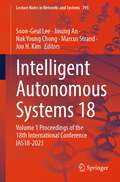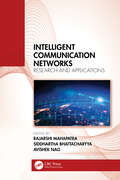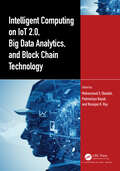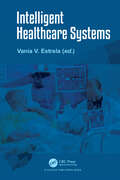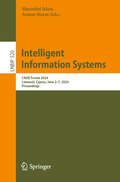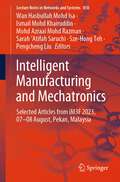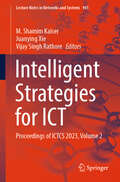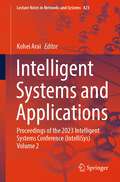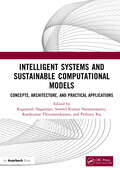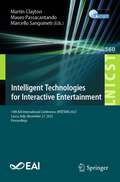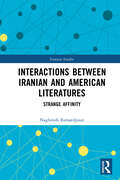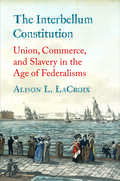- Table View
- List View
Insha'Allah, No, Maybe So
by Rhonda Roumani Nadia RoumaniA sweet and playful picture book about a common Arabic word for life's uncertainties that will ring true for all families.Ranya wants to go to the park. &“Insha&’Allah,&” her mom tells her. But doesn't that just mean no? Ranya's mom says &“Insha&’Allah&” when Ranya asks to make cookies. She says it when Ranya wants to sleep over at Jayda's house. She says it when Ranya begs to go to Disneyland.This might sound familiar to parents and caregivers . . . It&’s hard to know what to say when you can&’t promise anything! Sometimes grown-ups say &“Maybe&” or &“We&’ll see.&” And in millions of Arab and Muslim homes around the world, families use the phrase &“Insha&’Allah&” when talking about the future. So, what does &“Insha&’Allah&” really mean? In this warmly illustrated picture book, Ranya and her mom tackle the meaning of the powerful phrase and ponder the best way to talk about their hopes and dreams—and maybe, sometimes, the things they want to put off. (Like cleaning up toys!)Cozy art and joyful, loving characters make this a perfect family read aloud.A Junior Library Guild Gold Standard Selection
Inside AI: Over 150 billion purchases per year use this author's AI
by Akli AdjaouteSeparate the AI facts from the AI fiction, and discover how you can best put these tools to work in your organization.In Inside AI AI professor and entrepreneur Dr. Akli Adjaoute puts AI in perspective, with informed insights from 30 years spent in the field. His book lays out a pragmatic blueprint that every leader can utilize to drive innovation with artificial intelligence. In Inside AI you&’ll learn how to: Gain insight into diverse AI techniques and methodologies Learn from both successful and failed AI applications Identify the capabilities and limitations of AI systems Understand successful and failed uses of AI in business See where human cognition still exceeds AI Bust common myths like AI&’s threat to jobs and civilization Manage AI projects effectively Inside AI takes you on a journey through artificial intelligence, from AI&’s origins in traditional expert systems all the way to deep learning and Large Language Models. There&’s no hype here—you&’ll get the grounded, evidence-based insights that are vital for making strategic decisions and preparing your business for the future. About the technology Artificial Intelligence enthusiasts promise everything from human-like collaboration on everyday tasks to the end of work as we know it. Is AI just a flash in the pan, or can it really transform how you do business? This intriguing book sifts through the hype and separates the truth from the myths, with clear advice on what AI can—and can&’t—achieve. About the book Inside AI provides a clear-headed overview of modern artificial intelligence, including the recent advances of Generative AI and Large Language Models. Its accessible and jargon-free explanations of leading AI techniques showcase how AI delivers tangible advantages to businesses. Both inspiring and practical, this book provides a proven framework for developing successful AI applications. What's inside Insights from successful and failed AI applications A survey of AI techniques and methodologies Bust common AI myths Manage AI projects effectively About the reader For anyone seeking grounded insights into AI&’s capabilities, including business leaders and decision makers. About the author Akli Adjaoute is the founder of multiple AI-related companies. He served as an adjunct professor at the University of San Francisco and as Scientific Committee Chair and Head of the AI department at EPITA. The technical editor on this book was Richard Vaughan. Table of contents 1 The rise of machine intelligence 2 AI mastery: Essential techniques, Part 1 3 AI mastery: Essential techniques, Part 2 4 Smart agent technology 5 Generative AI and large language models 6 Human vs. machine 7 AI doesn&’t turn data into intelligence 8 AI doesn&’t threaten our jobs 9 Technological singularity is absurd 10 Learning from successful and failed applications of AI 11 Next-generation AI A Tracing the roots: From mechanical calculators to digital dreams B Algorithms and programming languages
Inside Thatcher’s Monetarism Experiment: The Promise, the Failure, the Legacy
by Tim LankesterIn 1979, Margaret Thatcher’s new government was faced with rampant double-digit inflation, rising unemployment and flatlining economic growth. In response, Mrs Thatcher pursued an economic policy which rejected the old orthodoxies and was promoted by only a minority of economists: a policy based on the doctrine of monetarism. This deeply damaging experiment in economic policy making promised much but completely failed to deliver. Tim Lankester was the private secretary for economic affairs to Mrs Thatcher during the early years of her government. His insider’s account explains her attitudes and decisions and those of the other main players. Offering fascinating insights into one of the most unsuccessful episodes of British economic history, he also relates its long-lasting impact and influence on society and the economy to this day, including present-day responses to tackling inflation.
Inspire Greatness: How to Motivate Employees with a Simple, Repeatable, Scalable Process
by Matt TenneyQuickly and sustainably improve employee motivation, engagement, and performance with this simple, four-step process from a top leadership expert.Leadership tends to be thought of as an art, not a science. Imagine the benefits of having an algorithm—a repeatable process based on decades of research on what motivates employees—that any leader could follow to consistently inspire greatness in others.From sought-after speaker and consultant Matt Tenney, Inspire Greatness outlines a simple, scalable, four-step process that enables leaders to routinely bring out the best in team members and improve performance by:Taking responsibility for employee engagement and acting from the wisdom that their primary job is to inspire greatness in their team members.Identifying what team members need to thrive and do great work.Collecting regular feedback on how well direct supervisors are meeting the 14 universal needs people have for being engaged at work.Pairing feedback for leaders with bite-size learning that is easy to consume and act on immediately.Tightly synchronizing employees&’ feedback with targeted, microlearning for their direct managers creates an incredibly powerful, synergistic effect by: (1) dramatically increasing the likelihood that managers will develop lasting habits that contribute to employee engagement, and (2) allowing employees to see meaningful action almost immediately in response to their feedback.Inspire Greatness is a practical guide to consistently bringing out the best in team members while also helping you and other leaders in your organization realize deep meaning and fulfillment at work.
Integer Programming and Combinatorial Optimization: 25th International Conference, IPCO 2024, Wroclaw, Poland, July 3–5, 2024, Proceedings (Lecture Notes in Computer Science #14679)
by Jens Vygen Jarosław ByrkaThis book constitutes the refereed proceedings of the 25th International Conference on Integer Programming and Combinatorial Optimization, IPCO 2024, held in Wrocław, Poland, during July 3–5, 2024. The 33 full papers presented were carefully reviewed and selected from 101 submissions. IPCO is under the auspices of the Mathematical Optimization Society, and it is an important forum for presenting present recent developments in theory, computation, and applications. The scope of IPCO is viewed in a broad sense, to include algorithmic and structural results in integer programming and combinatorial optimization as well as revealing computational studies and novel applications of discrete optimization to practical problems.
Integrated Waste Management: A Sustainable Approach from Waste to Wealth
by Akanksha Gupta Ravinder Kumar Vinod KumarThis book explores a diverse spectrum of waste materials, encompassing industrial hazardous and non-hazardous waste, agricultural waste, biomass waste, radioactive waste, municipal solid and liquid waste, as well as e-waste, and investigates their adverse impacts on the environment. It is an exciting exploration of various approaches to waste management, highlighting the importance of adopting sustainable practices such as the 7Rs principle, utilization of nanomaterials and photocatalysis, zero waste management techniques, recycling and upcycling techniques, and IoT-enabled strategies. It provides a critical assessment of the challenges and opportunities in transforming waste into value-added products for the industry. This book is designed to provide constructive insights for researchers, environmentalists, policy makers and professionals engaged in enhancing waste management, fuelling the circular economy, and paving the way for a sustainable future.
Integrating Social Justice into Student Affairs
by Brian BourkePushing back on the critique that social justice is often just a buzzword in student affairs, this book provides guidance on how to truly make social justice a fundamental part of student affairs.Shaped by voices of student affairs educators and up-to-date literature, Bourke offers guidance on how to approach social justice effectively and confidently as a student affairs educator. This book provides discussion of the core concepts connected to social justice, strategies for making social justice part of one's practice, and guidance on how to infuse social justice into practice throughout the field. Each chapter features reflection and discussion questions, as well as suggestions for further reading aiming to provide readers with fresh perspectives on how to center social justice in student affairs.Filled with extensive research, practical measures, and engaging prompts, this book serves as a launchpad for student affairs educators to be intentional with their practice and put words into action.
Integration of Constraint Programming, Artificial Intelligence, and Operations Research: 21st International Conference, CPAIOR 2024, Uppsala, Sweden, May 28–31, 2024, Proceedings, Part II (Lecture Notes in Computer Science #14743)
by Bistra DilkinaThis book constitutes the proceedings of the 21st International Conference on the Integration of Constraint Programming, Artificial Intelligence, and Operations Research, CPAIOR 2024, held in Uppsala, Sweden, during May 28–31, 2024.The 33 full papers and the 9 short papers presented in the proceedings were carefully reviewed and selected from a total of 104 submissions. The content of the papers focus on new techniques or applications in the area and foster the integration of techniques from different fields dealing with large and complex problems.
Integration of Constraint Programming, Artificial Intelligence, and Operations Research: 21st International Conference, CPAIOR 2024, Uppsala, Sweden, May 28–31, 2024, Proceedings, Part I (Lecture Notes in Computer Science #14742)
by Bistra DilkinaThis book constitutes the proceedings of the 21st International Conference on the Integration of Constraint Programming, Artificial Intelligence, and Operations Research, CPAIOR 2024, held in Uppsala, Sweden, during May 28–31, 2024. The 33 full papers and the 9 short papers presented in the proceedings were carefully reviewed and selected from a total of 104 submissions. The content of the papers focus on new techniques or applications in the area and foster the integration of techniques from different fields dealing with large and complex problems.
Integrative psychische Gesundheitsversorgung: Grundlagen, Theorie und klinische Anwendungen
by James H. LakeDieser wichtige Band bietet einen prägnanten Überblick über die konzeptionellen Grundlagen und klinischen Methoden, die der schnell entstehenden Subspezialität der integrativen psychischen Gesundheitspflege zugrunde liegen. Es werden Methoden erörtert, die Praktiker zu individualisierten integrativen Strategien anleiten, die sich mit den einzigartigen Symptomen und Umständen jedes einzelnen Patienten befassen, und es enthält praktische klinische Techniken zur Entwicklung von Interventionen, die auf Wohlbefinden, Prävention und Behandlung ausgerichtet sind.In der Übersicht enthalten:· Bewältigung der Herausforderungen psychischer Erkrankungen durch integrative psychiatrische Versorgung.· Sich verändernde Paradigmen und ihre Auswirkungen auf die psychische Gesundheitsversorgung· Modelle des Bewusstseins: Wie sie das Verständnis von normaler psychischer Funktion und psychischer Krankheit prägen· Methodische Grundlagen der integrativen psychiatrischen Versorgung· Behandlungsplanung in der integrativen psychiatrischen Versorgung· Die Zukunft der psychischen GesundheitspflegeA New Paradigm for Integrative Mental Healthcare (Ein neues Paradigma für die integrative psychische Gesundheitspflege) ist für die wachsende Zahl von Patienten, die eine integrative und alternative Behandlung für depressive Verstimmungen, Angstzustände, ADHS, bipolare Störungen, Schizophrenie und andere psychische Gesundheitsprobleme wie Müdigkeit und chronische Schmerzen suchen, relevant und zeitgemäß."Die Patienten schreien nach einem integrativen Ansatz, und dieses beispielhafte Buch liefertdie Vorlage für die Verwirklichung einer solchen Vision." -Jerome Sarris, MHSc, PhD, ND"Für die meisten konventionell ausgebildeten Kliniker besteht die Herausforderung nicht in der Frage "Funktioniert die Alternativmedizin?", sondern "Wie integriere ich die Alternativmedizin in meine klinische Praxis?" Lakes umfassender Ansatz beantwortet diese zentrale Frage und befähigt den Kliniker, eine wirklich integrative und effektive Pflege für Geist und Körper zu planen." -Leslie Korn, PhD, MPH
Integro-Differential Elliptic Equations (Progress in Mathematics #350)
by Xavier Ros-Oton Xavier Fernández-RealThis monograph offers a self-contained introduction to the regularity theory for integro-differential elliptic equations, mostly developed in the 21st century. This class of equations finds relevance in fields such as analysis, probability theory, mathematical physics, and in several contexts in the applied sciences. The work gives a detailed presentation of all the necessary techniques, with a primary focus on the main ideas rather than on proving all the results in their greatest generality. The basic building blocks are presented first, with the study of the square root of the Laplacian, and weak solutions to linear equations. Subsequently, the theory of viscosity solutions to nonlinear equations is developed, and proofs are provided for the main known results in this context. The analysis finishes with the investigation of obstacle problems for integro-differential operators and establishes the regularity of solutions and free boundaries. A distinctive feature of this work lies in its presentation of nearly all covered material in a monographic format for the first time, and several proofs streamline, and often simplify, those in the original papers. Furthermore, various open problems are listed throughout the chapters.
Intelligence, Sapience and Learning: Concepts, Framings and Practices (Routledge International Studies in the Philosophy of Education)
by David Scott Sandra Leaton GrayExamining the idea of intelligence in its diverse sociological and philosophical formations, Intelligence, Sapience and Learning explores the multiple and often complex meanings associated with the concept of intelligence, and its relationships with learning, curriculum and sapience. Scott and Leaton Gray explain a series of key concepts central to understanding the meta-concepts and practices of intelligence, learning and curriculum. These concepts include epistemology, free will and volition, hermeneutics, pragmatism, strong normative evaluations and pedagogy, amongst others. Focusing on six praxes that form a genealogy of the concept of intelligence, Scott and Leaton Gray argue for a re-framing of the concept and practice of intelligence, with profound consequences for how modern societies should be organised and how people should live their lives. This book is a follow-up to Women Curriculum Theorists: Power, Knowledge and Subjectivity, and takes a fresh look at the concept and practice of intelligence. It will appeal to curriculum theorists and those with an interest in curriculum and learning matters, as well as those working in the philosophy and sociology of education.
Intelligent Autonomous Systems 18: Volume 2 Proceedings of the 18th International Conference IAS18-2023 (Lecture Notes in Networks and Systems #794)
by Soon-Geul Lee Jinung An Nak Young Chong Marcus Strand Joo H. KimIntelligent autonomous systems are increasingly being applied in various fields, ranging from industrial applications to professional services and household domains. These advancements in technology and application domains have brought forth the need for continuous research and development to address new challenges in deploying intelligent autonomous systems in a reliable and user-independent manner This book is a compilation that aims to serve researchers and practitioners in related fields by providing a timely dissemination of recent progress in the areas of autonomous mobility and robotics. The contents of this book are based on a collection of papers presented at the 18th International Conference on Intelligent Autonomous Systems (IAS18 2023), held at the Suwon Convention Center in Suwon, Korea. The conference took place fully in person from July 4 to 7, 2023, with the theme “Impact and Effect of AI on Intelligent Autonomous Systems.” It encompassed discussions on theories, applications, and creative innovations in intelligent autonomous systems, covering topics such as autonomous vehicles, intelligent agents, smart sensors and actuators, smart haptics, human–machine interaction, digital twin, digital health, and metaverse, VR, AR, or MR. For ease of reading, the 91 papers have been grouped into five chapters: Chapter 1: Intelligent Autonomous Vehicles; Chapter 2: Autonomous Robots; Chapter 3: Intelligent Perception and Sensors; Chapter 4: Data Fusion and Machine Learning for Intelligent Robots; and Chapter 5: Applied Autonomous Systems. The articles included in this book underwent a rigorous peer-review process and were presented at the IAS18-2023 conference. For researchers working in the field of intelligent autonomous systems technology, we believe this book provides valuable insights into recent advances in autonomous technologies and applications, thereby enriching their studies. We extend our heartfeltthanks to all the authors and editors who contributed to this edition.
Intelligent Autonomous Systems 18: Volume 1 Proceedings of the 18th International Conference IAS18-2023 (Lecture Notes in Networks and Systems #795)
by Marcus Strand Soon-Geul Lee Jinung An Nak Young Chong Joo H. KimIntelligent autonomous systems are increasingly being applied in various fields, ranging from industrial applications to professional services and household domains. These advancements in technology and application domains have brought forth the need for continuous research and development to address new challenges in deploying intelligent autonomous systems in a reliable and user-independent manner. This book is a compilation that aims to serve researchers and practitioners in related fields by providing a timely dissemination of recent progress in the areas of autonomous mobility and robotics. The contents of this book are based on a collection of papers presented at the 18th International Conference on Intelligent Autonomous Systems (IAS18 2023), held at the Suwon Convention Center in Suwon, Korea. The conference took place fully in person from July 4 to 7, 2023, with the theme “Impact and Effect of AI on Intelligent Autonomous Systems.” It encompassed discussions on theories, applications, and creative innovations in intelligent autonomous systems, covering topics such as autonomous vehicles, intelligent agents, smart sensors and actuators, smart haptics, human–machine interaction, digital twin, digital health, and metaverse, VR, AR, or MR. For ease of reading, the 91 papers have been grouped into five chapters: Chapter 1: Intelligent Autonomous Vehicles; Chapter 2: Autonomous Robots; Chapter 3: Intelligent Perception and Sensors; Chapter 4: Data Fusion and Machine Learning for Intelligent Robots; and Chapter 5: Applied Autonomous Systems. The articles included in this book underwent a rigorous peer-review process and were presented at the IAS18-2023 conference. For researchers working in the field of intelligent autonomous systems technology, we believe this book provides valuable insights into recent advances in autonomous technologies and applications, thereby enriching their studies. We extend our heartfelt thanks to all the authors and editors who contributed to this edition.
Intelligent Communication Networks: Research and Applications
by Siddhartha Bhattacharyya Avishek Nag Rajarshi MahapatraWith the advent of Big Data, conventional communication networks are often limited in their inability to handle complex and voluminous data and information as far as effective processing, transmission, and reception are concerned. This book discusses the evolution of computational intelligence techniques in handling intelligent communication networks. Provides a detailed theoretical foundation of machine learning and computational intelligence algorithms Highlights the state of art machine learning-based solutions for communication networks Presents video demonstrations and code snippets on each chapter for easy understanding of the concepts Discusses applications including resource allocation, spectrum management, channel estimation, and physical layer of wireless networks Demonstrates applications of machine learning techniques for optical networks The text is primarily intended for senior undergraduate and graduate students and academic researchers in fields of electrical engineering, electronics and communication engineering, and computer engineering.
Intelligent Computing on IoT 2.0, Big Data Analytics, and Block Chain Technology
by Mohammad S. Obaidat Padmalaya Nayak Niranjan K. RayThe book is designed as a reference text and explores the concepts and techniques of IoT, artificial intelligence (AI), and blockchain. It also discusses the possibility of applying blockchain for providing security in various domains. The specific highlight of this book is focused on the application of integrated technologies in enhancing data models, better insights and discovery, intelligent predictions, smarter finance, smart retail, global verification, transparent governance, and innovative audit systems. The book discusses the potential of blockchain to significantly increase data while boosting accuracy and integrity in IoT-generated data and AI-processed information. It elucidates definitions, concepts, theories, and assumptions involved in smart contracts and distributed ledgers related to IoT systems and AI approaches. The book offers real-world uses of blockchain technologies in different IoT systems and further studies its influence in supply chains and logistics, the automotive industry, smart homes, the pharmaceutical industry, agriculture, and other areas. It also presents readers with ways of employing blockchain in IoT and AI, helping them to understand what they can and cannot do with blockchain. The book is aimed primarily at advanced undergraduates and graduates studying computer science, computer engineering, electrical engineering, information systems, computational sciences, artificial intelligence, and information technology. Researchers and professionals will also find this book very useful.
Intelligent Healthcare Systems
by Vania V. EstrelaThe book sheds light on medical cyber-physical systems while addressing image processing, microscopy, security, biomedical imaging, automation, robotics, network layers’ issues, software design, and biometrics, among other areas. Hence, solving the dimensionality conundrum caused by the necessity to balance data acquisition, image modalities, different resolutions, dissimilar picture representations, subspace decompositions, compressed sensing, and communications constraints. Lighter computational implementations can circumvent the heavy computational burden of healthcare processing applications. Soft computing, metaheuristic, and deep learning ascend as potential solutions to efficient super-resolution deployment. The amount of multi-resolution and multi-modal images has been augmenting the need for more efficient and intelligent analyses, e.g., computer-aided diagnosis via computational intelligence techniques. This book consolidates the work on artificial intelligence methods and clever design paradigms for healthcare to foster research and implementations in many domains. It will serve researchers, technology professionals, academia, and students working in the area of the latest advances and upcoming technologies employing smart systems’ design practices and computational intelligence tactics for medical usage. The book explores deep learning practices within particularly difficult computational types of health problems. It aspires to provide an assortment of novel research works that focuses on the broad challenges of designing better healthcare services.
Intelligent Information Systems: CAiSE Forum 2024, Limassol, Cyprus, June 3–7, 2024, Proceedings (Lecture Notes in Business Information Processing #520)
by Arnon Sturm Shareeful IslamThis book constitutes the thoroughly refereed proceedings of the CAiSE Forum 2024 which was held in Limassol, Cyprus, in June 2024, as part of the 36th International Conference on Advanced Information Systems Engineering, CAiSE 2024. The CAiSE Forum is a place within the CAiSE conference for presenting and discussing new ideas and tools related to information systems engineering. Intended to serve as an interactive platform, the Forum aims at the presentation of emerging new topics and controversial positions, as well as demonstration of innovative systems, tools and applications. This year a special emphasis was given on Information Systems in the Age of Artificial Intelligence. The Forum received 31 submissions; 8 submissions were invited from the CAISE main research track. Out of the 23 regular submissions, 11 papers have been accepted. The 18 papers included in these proceedings include 10 vision papers and 8 tool demonstration papers.
Intelligent Manufacturing and Mechatronics: Selected Articles from iM3F 2023, 07–08 August, Pekan, Malaysia (Lecture Notes in Networks and Systems #850)
by Wan Hasbullah Mohd Isa Ismail Mohd Khairuddin Mohd Azraai Mohd Razman Sarah 'Atifah Saruchi Sze-Hong Teh Pengcheng LiuThis book presents parts of the iM3F 2023 proceedings from the mechatronics as well as the intelligent manufacturing tracks. It highlights recent trends and key challenges in mechatronics as well as the advent of intelligent manufacturing engineering and technology that are non-trivial in embracing Industry 4.0 as well as addressing the UN Sustainable Development Goals. The book deliberates on conventional as well as advanced solutions that are utilized in the variety of mechatronics and intelligent manufacturing-based applications. The readers are envisaged to gain an insightful view on the current trends, issues, mitigating factors as well as solutions from this book. It provides a platform that allows academics as well as other relevant stakeholders to share, discuss, and deliberate their latest research findings in the field of manufacturing, mechatronics, and materials, respectively.
Intelligent Strategies for ICT: Proceedings of ICTCS 2023, Volume 2 (Lecture Notes in Networks and Systems #941)
by Vijay Singh Rathore M. Shamim Kaiser Juanying XieThis book contains best selected research papers presented at ICTCS 2023: Eighth International Conference on Information and Communication Technology for Competitive Strategies. The conference was held in Jaipur, India during 8 – 9 December 2023. The book covers state-of-the-art as well as emerging topics pertaining to ICT and effective strategies for its implementation for engineering and managerial applications. This book contains papers mainly focused on ICT for computation, algorithms and data analytics and IT security. The work is presented in three volumes.
Intelligent Systems and Applications: Proceedings of the 2023 Intelligent Systems Conference (IntelliSys) Volume 2 (Lecture Notes in Networks and Systems #823)
by Kohei AraiThe book is a unique collection of studies involving intelligent systems and applications of artificial intelligence in the real world to provide solutions to most vexing problems. IntelliSys received an overwhelming 605 papers which were put under strict double-blind peer-review for their novelty, originality and exhaustive research. Finally, 227 papers were sieved and chosen to be published in the proceedings.This book is a valuable collection of all the latest research in the field of artificial intelligence and smart systems. It provides a ready-made resource to all the readers keen on gaining information regarding the latest trends in intelligent systems. It also renders a sneak peek into the future world governed by artificial intelligence.
Intelligent Systems and Sustainable Computational Models: Concepts, Architecture, and Practical Applications
by Pethuru Raj Rajganesh Nagarajan Ramkumar Thirunavukarasu Senthil Kumar NarayanasamyThe fields of intelligent systems and sustainability have been gaining momentum in the research community. They have drawn interest in such research fields as computer science, information technology, electrical engineering, and other associated engineering disciples. The promise of intelligent systems applied to sustainability is becoming a reality due to the recent advancements in the Internet of Things (IoT), Artificial Intelligence, Big Data, blockchain, deep learning, and machine learning. The emergence of intelligent systems has given rise to a wide range of techniques and algorithms using an ensemble approach to implement novel solutions for complex problems associated with sustainability.Intelligent Systems and Sustainable Computational Models: Concepts, Architecture, and Practical Applications explores this ensemble approach towards building a sustainable future. It explores novel solutions for such pressing problems as smart healthcare ecosystems, energy efficient distributed computing, affordable renewable resources, mitigating financial risks, monitoring environmental degradation, and balancing climate conditions. The book helps researchers to apply intelligent systems to computational sustainability models to propose efficient methods, techniques, and tools. The book covers such areas as: Intelligent and adaptive computing for sustainable energy, water, and transportation networks Blockchain for decentralized systems for sustainable applications, systems, and infrastructure IoT for sustainable critical infrastructure Explainable AI (XAI) and decision-making models for computational sustainability Sustainable development using edge computing, fog computing and cloud computing Cognitive intelligent systems for e-learning Artificial Intelligence and machine learning for large scale data Green computing and cyber physical systems Real-time applications in healthcare, agriculture, smart cities, and smart governance.By examining how intelligent systems can build a sustainable society, the book presents systems solutions that can benefit researchers and professionals in such fields as information technology, health, energy, agricultural, manufacturing, and environmental protection.
Intelligent Technologies for Interactive Entertainment: 14th EAI International Conference, INTETAIN 2023, Lucca, Italy, November 27, 2023, Proceedings (Lecture Notes of the Institute for Computer Sciences, Social Informatics and Telecommunications Engineering #560)
by Martin Clayton Mauro Passacantando Marcello SanguinetiThis book constitutes the refereed proceedings of the 14th International Conference on Intelligent Technologies for Interactive Entertainment, INTETAIN 2023 which was held in Lucca, Italy, during November 27, 2023.The 15 full papers presented in this book were selected from 56 submissions. They present novel and innovative work in areas of methods (machine learning, movement), computer-based systems (architectures, software, algorithms), and devices (digital cameras, smartphones). The papers are grouped in sessions of thematic issues on Games and Game-Based learning; Motion Capture; Sports and Competitions; and Interfaces and Applications.
Interactions Between Iranian and American Literatures: Strange Affinity (Iranian Studies)
by Naghmeh EsmaeilpourIntroducing "narrative mobility" as a new approach in comparative studies of Iran and the US, this book reinterprets the politics and aesthetics of relations between the nations through an analysis of Iranian and American authors.The book focuses specifically on three authors—Simin Daneshvar, Shahriar Mandanipour, and Don DeLillo—who each employ narrative mobility to rethink intercultural negotiation, addressing parallel issues in America and Iran from different, but complementary, perspectives. The book analyzes the employment of parallel narrational techniques, presenting physically and virtually mobile characters who embody their respective countries as they move from one culture to another. The strange affinity between Iran and the US is ultimately revealed by viewing literary works as a "contact zone" through which the complicated relations and shared history of the two nations can be renegotiated. On a more theoretical level, the book reflects on the role of literature—in particular the novel as a transnational medium—as a bridge between nations in a period of globalization.With its focus on cross-cultural connections, the book will be of interest to anyone studying or researching comparative literature, US–Iran relations, and cultural studies generally.
The Interbellum Constitution: Union, Commerce, and Slavery in the Age of Federalisms (Yale Law Library Series in Legal History and Reference)
by Alison L. LaCroixA synthesis of legal, political, and social history to show how the post-founding generations were forced to rethink and substantially revise the U.S. constitutional vision Between 1815 and 1861, American constitutional law and politics underwent a profound transformation. These decades of the Interbellum Constitution were a foundational period of both constitutional crisis and creativity. The Interbellum Constitution was a set of widely shared legal and political principles, combined with a thoroughgoing commitment to investing those principles with meaning through debate. Each of these shared principles—commerce, concurrent power, and jurisdictional multiplicity—concerned what we now call &“federalism,&” meaning that they pertain to the relationships among multiple levels of government with varying degrees of autonomy. Alison L. LaCroix argues, however, that there existed many more federalisms in the early nineteenth century than today&’s constitutional debates admit. As LaCroix shows, this was a period of intense rethinking of the very basis of the U.S. national model—a problem debated everywhere, from newspapers and statehouses to local pubs and pulpits, ultimately leading both to civil war and to a new, more unified constitutional vision. This book is the first that synthesizes the legal, political, and social history of the early nineteenth century to show how deeply these constitutional questions dominated the discourse of the time.

